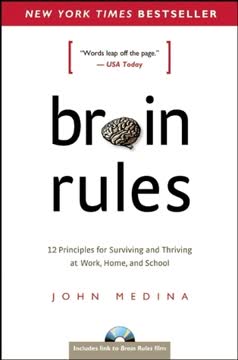重点摘要
1. 社交联系对大脑健康和长寿至关重要
友谊及其周围的社交活动是本章的主要焦点。
社交联系是大脑的维生素。 研究表明,保持强大的社交关系可以将认知衰退的风险降低多达70%。这种效果非常强大,即使是通过互联网进行社交也能带来好处。社交互动刺激大脑的各个部分,起到神经通路锻炼的作用。
孤独对大脑有害。 长期的社交隔离会导致压力激素增加、免疫功能减弱和血压升高。它甚至与老年人45%的更高死亡风险相关。为应对这一问题,老年人应:
- 与朋友和家人保持定期联系
- 加入社交俱乐部或社区团体
- 参与志愿服务或集体活动
- 在无法面对面交流时使用技术保持联系
2. 培养感恩和积极情绪增强认知功能
“我们反对脑力游戏为消费者提供科学依据的途径来减少或逆转认知衰退的说法,因为迄今为止没有令人信服的科学证据支持这一点。”
积极情绪提升大脑健康。 研究表明,专注于积极情绪和经历的老年人往往具有更好的认知功能。这种“积极效应”可以通过感恩练习和对生活经历的正念欣赏来培养。
培养积极情绪的实用方法:
- 保持每日感恩日记
- 进行随机的善举
- 练习正念冥想
- 参与带来快乐和满足的活动
- 与积极的人相处
大脑的可塑性允许这些积极的变化在任何年龄发生,表明通过积极情绪改善认知功能永远不会太晚。
3. 正念练习减少压力并提高心理清晰度
正念意味着以特定的方式注意;有目的地、在当下、非评判性地。
正念是大脑健康的强大工具。 定期的正念练习已被证明可以减少压力、提高注意力,甚至减缓认知衰退。它通过改变与情绪调节和认知控制相关的大脑活动来发挥作用。
正念对老年大脑的主要好处:
- 降低皮质醇水平,长期来看可以防止脑细胞受损
- 改善工作记忆和执行功能
- 增强情绪调节和韧性
- 增加与学习和记忆相关的大脑区域的灰质体积
每天仅需10-15分钟的正念练习即可显著改善大脑健康和整体福祉。
4. 终身学习保持大脑敏锐并延缓认知衰退
记住,学习或教学永远不会太晚。
持续学习创造认知储备。 终身参与新的学习体验有助于建立认知储备,从而延缓或预防认知衰退。即使是晚年开始学习新技能的人也是如此。
促进终身学习的有效方法:
- 学习一门新语言或乐器
- 进行具有挑战性的爱好或手工艺
- 参加讲座或教育研讨会
- 广泛阅读各种主题
- 在你的专业领域教授或指导他人
研究表明,每接受一年教育,认知衰退就会延迟0.21年。关键是参与新颖、具有挑战性和智力刺激的活动。
5. 定期锻炼提升大脑功能和整体健康
在其强大和普遍的益处方面,唯一接近灵丹妙药的东西就是锻炼。
锻炼是强效的大脑助推器。 尤其是有氧运动,已被证明可以增加大脑体积、改善认知功能并降低痴呆风险。即使是适量的锻炼也能显著改善大脑健康。
锻炼对老年大脑的主要好处:
- 增加大脑的血流量,提供更多的氧气和营养
- 刺激新脑细胞的生成(神经发生)
- 增强现有脑细胞之间的连接
- 减少大脑中的炎症和氧化应激
- 改善情绪并减少抑郁和焦虑症状
每周至少进行150分钟中等强度的有氧活动或75分钟高强度活动,并每周进行两次力量训练。
6. 饮食在维持认知功能中起关键作用
吃食物。不多。主要是植物。
有益大脑的饮食可以减缓认知衰退。 研究指出,地中海饮食和MIND饮食对大脑健康特别有益。这些饮食富含水果、蔬菜、全谷物、瘦蛋白和健康脂肪。
有益大脑的饮食的关键成分:
- 绿叶蔬菜(如菠菜、羽衣甘蓝)
- 浆果,尤其是蓝莓
- 坚果和种子
- 富含欧米伽-3的脂肪鱼(如三文鱼、沙丁鱼)
- 全谷物
- 橄榄油
- 限制红肉和加工食品
这些饮食通过减少炎症、保护免受氧化应激并促进新脑细胞的生长来发挥作用。此外,通过适当的营养保持健康体重可以减少与肥胖及相关疾病相关的认知衰退风险。
7. 高质量的睡眠对大脑健康和记忆巩固至关重要
我们睡觉是为了学习(突破之一)
睡眠对大脑维护和记忆巩固至关重要。 在睡眠期间,大脑清除有毒废物并巩固当天的记忆。长期睡眠不足会导致认知衰退和痴呆风险增加。
改善睡眠质量的建议:
- 保持一致的睡眠时间表
- 创建放松的睡前例行程序
- 保持卧室凉爽、黑暗和安静
- 睡前至少一小时避免使用屏幕
- 限制咖啡因和酒精,尤其是在晚上
- 定期锻炼,但不要离睡前太近
每晚目标是7-9小时的睡眠。如果睡眠问题持续存在,请咨询医疗专业人员,因为未治疗的睡眠障碍会显著影响大脑健康。
8. 了解阿尔茨海默病:症状、风险和潜在预防措施
在问“我是否患有阿尔茨海默病”之前,先寻找10个迹象。
早期检测是管理阿尔茨海默病的关键。 虽然没有治愈方法,但早期干预可以减缓病情进展并改善生活质量。重要的是区分正常的年龄相关变化和阿尔茨海默病的迹象。
阿尔茨海默病的10个警告信号:
- 干扰日常生活的记忆丧失
- 计划或解决问题的挑战
- 完成熟悉任务的困难
- 对时间或地点的困惑
- 理解视觉图像和空间关系的新问题
- 说话或写作中的新问题
- 物品放错地方并失去重新追踪步骤的能力
- 判断力下降或判断力差
- 退出工作或社交活动
- 情绪和个性变化
如果你或你的亲人经历了这些症状中的几个,请咨询医疗专业人员进行评估。虽然不能确定预防阿尔茨海默病,但饮食、锻炼、社交参与和认知刺激等生活方式因素可能会降低风险。
9. 衰老不是疾病,而是可以优化的自然过程
衰老不是疾病,就像青春期不是疾病一样。这是一个自然过程,通常会导致巨大的误解。
衰老是一个可以影响的自然过程。 虽然我们无法停止衰老,但我们可以通过生活方式选择来优化这一过程。基因起作用,但环境因素和个人行为对我们如何衰老有重大影响。
影响健康衰老的关键因素:
- 基因(占长寿的25-33%)
- 生活方式选择(饮食、锻炼、社交参与)
- 环境因素(压力、污染)
- 医疗保健的获取和利用
- 对衰老的态度和心态
通过关注可改变的因素,我们可以显著改善健康寿命——我们在健康状态下生活的年数。这种方法将重点从仅仅延长寿命转移到提高晚年生活质量。
10. 退休应重新定义为持续参与的时期
退休是你能对自己做的最糟糕的事情之一!
传统的退休对大脑健康有害。 研究表明,完全退休会导致认知衰退加速、抑郁风险增加,甚至更高的死亡率。相反,退休应重新定义为持续参与和有目的的时期。
脑健康退休的策略:
- 追求兼职工作或咨询工作
- 为你热衷的事业做志愿者
- 通过课程或研讨会进行终身学习
- 指导年轻一代
- 开始新的爱好或业务
- 旅行并体验新文化
关键是保持目的感、社交联系和智力刺激。这种方法不仅有益于个人退休人员,还为社会贡献宝贵的经验和智慧。
最后更新日期:
FAQ
What's Brain Rules for Aging Well about?
- Focus on Aging and Brain Health: The book delves into how aging impacts the brain and offers scientific insights for maintaining cognitive health.
- Geroscience Insights: It introduces geroscience, a field studying aging and ways to mitigate its effects on the brain and body.
- Practical Advice: Author John Medina provides actionable strategies to enhance memory, reduce stress, and improve overall well-being in later years.
Why should I read Brain Rules for Aging Well?
- Evidence-Based Information: The book is grounded in peer-reviewed research, offering a reliable source for understanding the aging process.
- Practical Strategies: It outlines ten actionable brain rules to help maintain cognitive vitality and happiness as you age.
- Optimistic Perspective: Medina counters the stereotype of decline with evidence of potential growth and happiness in aging.
What are the key takeaways of Brain Rules for Aging Well?
- Social Connections Matter: Maintaining friendships and social interactions is crucial for cognitive health and can reduce cognitive decline risk.
- Mindfulness and Stress Management: Practicing mindfulness can improve emotional regulation and cognitive function, aiding stress management.
- Lifelong Learning is Essential: Engaging in new learning experiences can enhance memory and cognitive abilities.
What are the best quotes from Brain Rules for Aging Well and what do they mean?
- “Be a friend to others, and let others be a friend to you.”: Highlights the importance of social connections for cognitive health and emotional well-being.
- “Mindfulness not only soothes but improves.”: Emphasizes mindfulness's dual benefits in reducing stress and enhancing cognitive function.
- “Remember, it’s never too late to learn—or to teach.”: Encourages embracing lifelong learning to keep the brain active and engaged.
What are the ten brain rules outlined in Brain Rules for Aging Well?
- Be a Friend: Cultivating relationships is vital for mental health.
- Cultivate Gratitude: Practicing gratitude can enhance happiness and well-being.
- Mindfulness Matters: Mindfulness practices can improve cognitive function and reduce stress.
- Never Stop Learning: Engaging in new learning experiences keeps the brain active.
- Train with Video Games: Certain video games can enhance cognitive abilities and processing speed.
How does social interaction affect cognitive health according to Brain Rules for Aging Well?
- Vitamins for the Brain: Social interactions provide essential cognitive benefits, likened to vitamins.
- Reduced Cognitive Decline: Regular socialization can slow cognitive decline by 70% compared to isolation.
- Positive Social Interactions: Engaging in positive exchanges enhances mood and cognitive function.
What role does mindfulness play in aging well as discussed in Brain Rules for Aging Well?
- Stress Reduction: Mindfulness lowers cortisol levels, reducing stress and its negative brain effects.
- Cognitive Improvement: Regular practice enhances attention and working memory.
- Emotional Regulation: Mindfulness aids in managing emotions, improving overall mental health.
What are the signs of Alzheimer’s disease to look for as mentioned in Brain Rules for Aging Well?
- Memory Loss: Frequent forgetfulness, especially of recent events or conversations.
- Difficulty with Familiar Tasks: Struggling with routine tasks.
- Confusion with Time or Place: Losing track of dates, seasons, and time passage.
How can diet and exercise impact brain health according to Brain Rules for Aging Well?
- Exercise Benefits: Regular physical activity improves cognitive function and helps stave off decline.
- Nutritional Choices: Diets rich in omega-3s enhance memory and lower Alzheimer’s risk.
- Overall Health Connection: Healthy diet and exercise contribute to better overall health, crucial for cognitive abilities.
What is mild cognitive impairment (MCI) as defined in Brain Rules for Aging Well?
- Transitional Stage: MCI is a stage between normal aging and serious cognitive decline, with noticeable memory issues.
- Varied Symptoms: Includes forgetfulness, decision-making difficulties, and social behavior changes.
- Importance of Evaluation: Early detection through medical evaluation can lead to better management.
What lifestyle changes does Brain Rules for Aging Well recommend for healthy aging?
- Regular Exercise: Emphasizes physical activity for cognitive and emotional health.
- Healthy Diet: Recommends diets rich in fruits, vegetables, whole grains, and healthy fats.
- Social Engagement: Encourages cultivating friendships and participating in community activities.
What is the significance of the Nun Study mentioned in Brain Rules for Aging Well?
- Longitudinal Research: Examined cognitive health of nuns over time, providing insights into aging and cognitive resilience.
- Autobiographical Writing: Complexity in early life writing predicted later cognitive health.
- Mixed Pathologies: Revealed that many with Alzheimer’s pathology showed no symptoms, highlighting disease complexity.
评论
《大脑规则:健康老龄化》因其引人入胜的写作风格和实用的认知健康维护建议而广受好评。读者们赞赏书中科学的解释和可操作的建议,包括社交联系、锻炼、终身学习和正念的重要性。一些人批评书中比喻和轶事的过度使用。许多人认为这本书内容丰富且鼓舞人心,特别是关于痴呆症和阿尔茨海默病的章节。总体而言,评论者推荐这本书作为理解大脑健康和实施健康老龄化策略的易懂指南。
Similar Books












